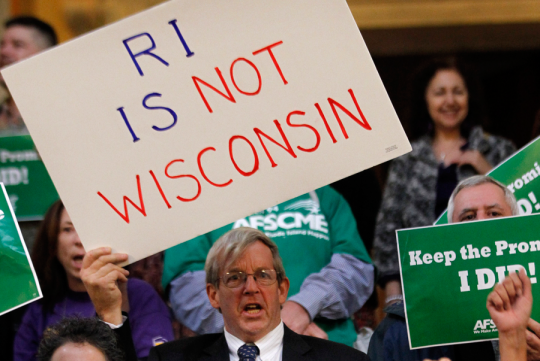Vice President Joe Biden visits Providence, R.I., today to raise money for Sen. Sheldon Whitehouse (D., R.I.). The visit—to a city on the verge of bankruptcy, in one of the most financially distressed states in the country—highlights the difficulties governments face when unfunded liabilities become unsustainable.
The Democratic Party’s control of the state is practically unmatched elsewhere in the country. Although Republicans held the governor’s office from 1995-2011, Democrats have dominated practically every other statewide office, and the state legislature in particular.
According to a February 2011 Gallup survey, the state is the third most liberal in the country, with nearly 30 percent of the population identifying as liberals. Democrats currently control 29 of 38 seats in the Rhode Island State Senate, and 65 out of 75 seats in the State House of Representatives, despite a bad year in 2010 when the party lost four seats in each chamber.
Even the state’s Republicans are quite liberal. Current governor Lincoln Chafee—a Republican turned Independent—was recently named a national co-chair of President Obama’s reelection campaign.
In addition to being one of the most left-leaning states, Rhode Island is one of the most troubled economically. A 2009 Pew Center report on financially distressed states noted that Rhode Island was "one of the first states to fall into the recession, and … may be one of the last to emerge."
"Rhode Island consistently ranks near the top of states with the highest unemployment rates, and last year it had the highest home foreclosure rates in all of New England," the report stated. "State government has a poor record of managing its finances, and its economic recovery is hampered by high tax rates, persistent state budget deficits and a lack of high-tech jobs."
A 2012 study by the non-partisan Tax Foundation found that Rhode Island has the fifth worst business environment in the country, largely as a result of high state taxes on income, property, and business.
The situation is even more dire at the municipal level. The city of Central Falls, R.I., filed for bankruptcy last year, and Providence Mayor Angel Taveras warned earlier this month that the state’s capital could be next.
Three major credit agencies have downgraded the city of Providence’s credit rating by two notches within the past year. Fitch Ratings, in explaining its decision, criticized former Mayor David Cicilline (D), now a member of Congress, for "imprudent budgeting decisions" and "rapid spending growth."
Taveras, also Democrat, is seeking to close a $22.5 million shortfall for the remainder of the fiscal year. In order to do so, he’ll have to reverse the course of his predecessors’ policies, which have helped fueled a massive pension system for city employees.
As Taveras recently noted in his State of the City address, the city’s top 25 pension recipients are each earning more than $109,000 a year in retirement. One former fire chief, who retired in 1991 with an annual salary of $63,000, was currently earning almost $200,000 on pension.
"Local governments in Rhode Island have systematically handed out pension benefits that they can’t afford to finance," said Josh Barro, a senior fellow at the Manhattan Institute. "This is all done at the behest of public employee unions."
Rhode Island had the second highest public-sector unionization rate in the country (67 percent) in 2010. The unions are major players in Rhode Island politics, giving more than $400,000 to state candidates in 2010. A majority of that money went to Democrats.
Such influence has helped public employees secure significant advantages compared to their private sector counterparts. According to the Bureau of Economic Analysis, Rhode Island’s public sector workers ranked seventh in terms of wages and benefits relative to other states in 2009. The state’s private sector employees, meanwhile, ranked fifteenth on the list.
Three years ago, Rhode Island faced unfunded pension liabilities of $4.4 billion, and unfunded healthcare and other liabilities of about $800 million. Together, these amounted to more than half of the state budget.
Barro said state lawmakers recently passed "the most aggressive pension reform law in the country," which reduced the value of current pensions and significantly shifted pension liabilities from taxpayers to the state employees themselves.
Even with the reforms, however, Rhode Island is projecting a fiscal year 2013 budget shortfall of between $125 million and $150 million. Some doubt the reforms will be sufficient to ward off future crises. A recent Mercatus Center study estimated that the true cost of Rhode Island’s unfunded pension liability is approximately twice the number projected by the state.
Mike Stenhouse of the nonpartisan Rhode Island Center for Freedom and Prosperity says state lawmakers still have a long way to go.
"It’s a great first step, but we don’t believe this issue is behind us," Stenhouse told the Free Beacon. "We will almost definitely have to do this again 5, 10, 15 years from now."
Rhode Island’s fiscal troubles, Stenhouse argued, are the inevitable result of the corrupting alliance between powerful interest groups and the politicians whose campaigns they fund.
"These problems are caused by special interests and influence peddling," Stenhouse said. "We would ask the vice president, how much longer we want to keep going down this road?"
